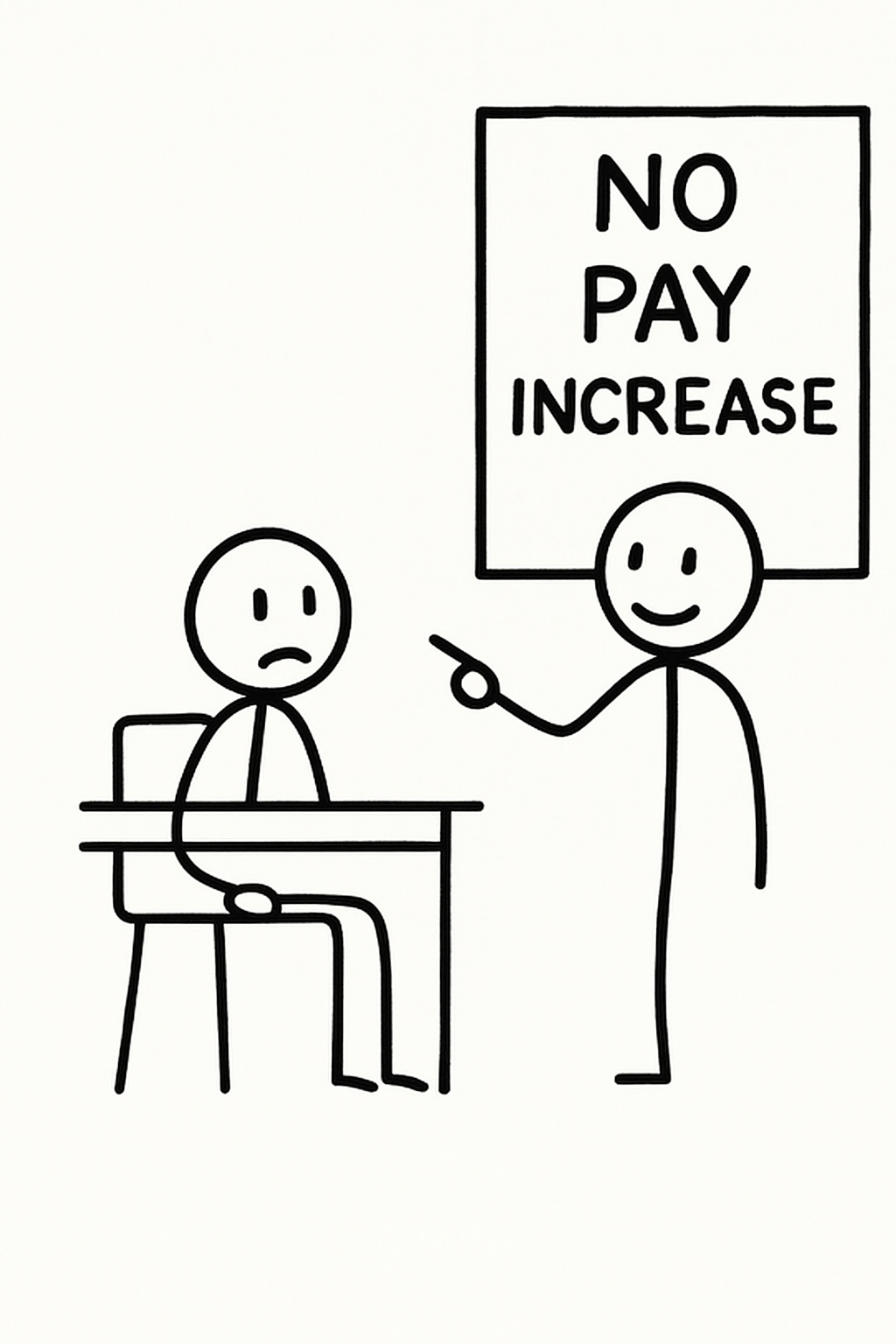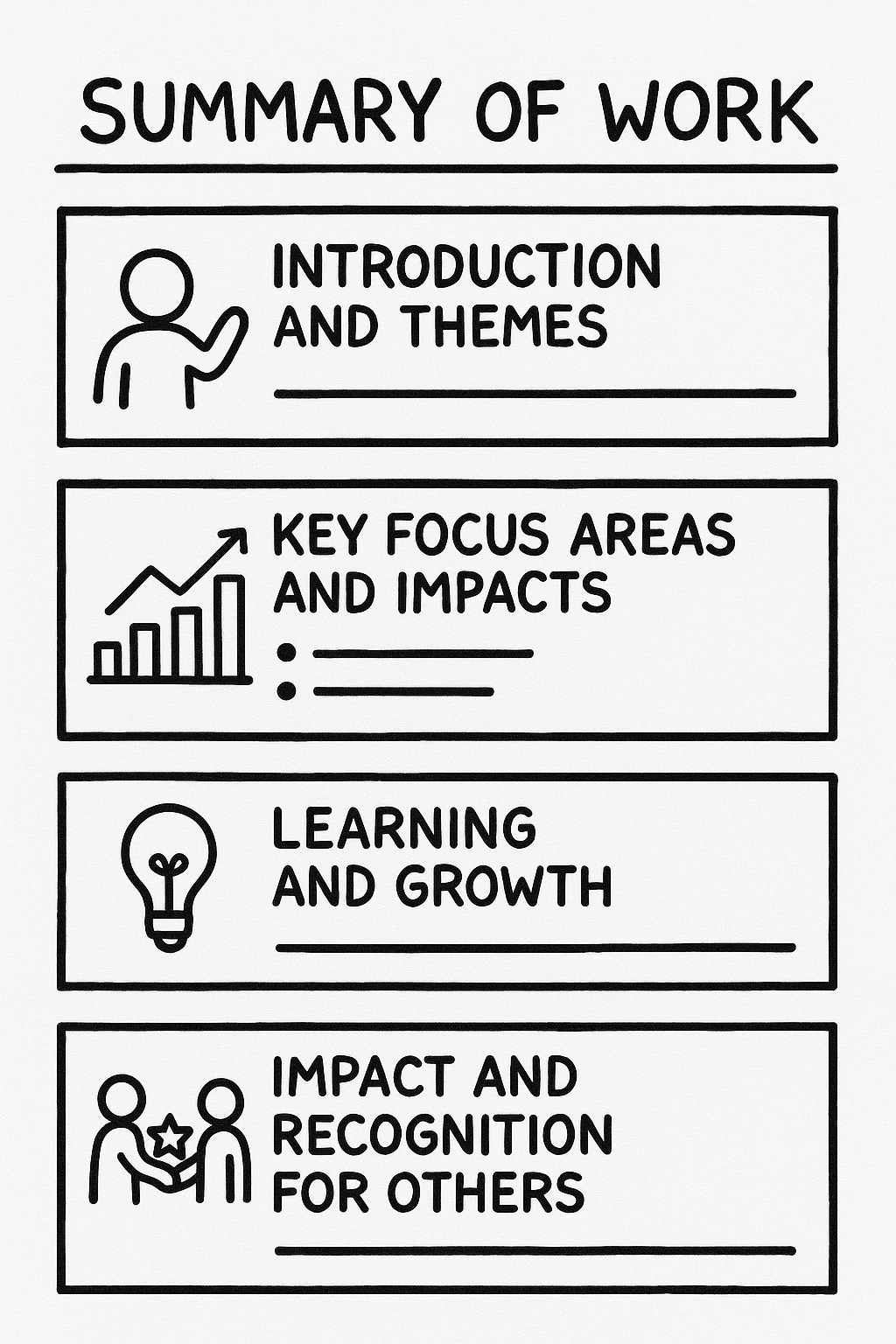Summarize Your Work and Improve Compensation Outcomes
How clearly articulating your impact and ways you improved your value to increase your chance of compensation increases
Welcome my Data engineers, practical practitioners, awesome analysts, visualization wizards, and data protection paladins to the Engineer Setlist. I see many of you joined courtesy of my friend Zach Wilson. I'm so glad you are here! My mission is to help technical experts accelerate their impact, do the best work of their careers, and get the recognition they deserve no matter their role or tenure. If you enjoy my writing you can help by sharing my blog with others. For now, let's jam!I believe technical contributors who can clearly articulate their impact are more likely to earn better projects, stronger recognition, and higher compensation.
When managers generally go through compensation planning, they collect or are provided (depending on the company) compensation data. They may do some research following up with other companies, and ideally they may look at your work. If you work in a more nebulous role or staff+, your manager may not be as familiar with your day to day (e.g. you might not be cutting PRs every week).
A few weeks go by, and you may or may not get a message from your manager to share a bit more information on your projects, or some performance review check in which may be lightweight and generic. They eventually go into compensation setting, which has checks/safeguards with HRBPs and peers, and the numbers are entered.
In this story, you sit down with your manager in a few weeks, and possibly performance review (depending on company) and they share the number. The number is flat, no compensation increase since the industry didn’t really shift much and the market isn’t great. This was the third year in a row with no increase yet you continue to feel like you are driving company wide impact and leveling up your skills each year.
Does this sound a bit like you?
This was me as well. I didn’t really realize that I had a lot more leverage during the compensation process, by being able to clearly describe my impact, outcomes, and why my market value had increased. Backed with data, examples, and collaborators, I started to put together a defensible summary of work each year that I timed around compensation planning.
My Summary of Work approach has provided several benefits:
I was able to celebrate the cross-functional peers I worked with, by listing them in my summary and sharing it with them (and sometimes their managers)
I have a running yearly log of my accomplishments and impacts, so I can quickly bring a new leader up to speed on what I deliver and how I work
My manager can see the entire story of my work, all of the impacts and outcomes at once.
I can quickly reference these documents when someone asks me about key project from year XXXX, so my impact is always visible
These summary of work documents aren’t terribly difficult to create, but they do require a lot of record keeping through out the year. Let’s step through creating one and some ways to make that easier.
Summary of Work
For this post, I wanted to leave my readers with a template and “example” so you can put your’s together given many companies set comp later this year. Copy it here:
Summary of Work Template Google Doc
I’m going to very quickly give you the high level of what we cover in the summary of work, since the template doc has a deeper dive. PLEASE COPY AND USE THE TEMPLATE, I can’t stress enough how much this has helped me advocate for compensation increases!
In your summary of work memo, your goal is to demonstrate why your market value has increased. Some call this a brag sheet, but that seems too narrow to me. Instead, we also focus on celebrating the work of others, and misses, allowing us to strengthen the connection with our peers and show we’re open to taking risks and failing gracefully.
You start with the introduction, what motivated your key outcome and what strategies you took to get there (themes, or focus areas). A key outcome could be to reduce toil for data engineers so that they can focus on innovation. Key themes to drive that goal could be improving data quality, clarifying data ownership, and data debt reduction.
Then for each focus area, show quantifiable, outcomes that clearly show your impact and help drive the theme that leads to the key outcome. An example for data debt could be reduced failed pipeline executions by XX% (Count/Count) on our top 3 data products.
Next, you focus on learnings and areas of growth (e.g. where did you fail, step in it, or miss on something), and what actions you’ll take to grow.
Then the most important part is articulating your impact is only possible with the work of others. Share gratitude with them to continue building trust and strength, and list their names. Make sure when you share your summary of work you BCC them.
Now that we've covered the structure and benefits, let's talk about the practical steps to make this process sustainable throughout the year.
Good Record Keeping
The most important thing to start doing today is keeping a log of the impact you are driving. The foundation of a compelling summary of work is remembering what you did! Don't wait until compensation planning season to scramble for examples. You may have examples in buckets of work such as
Key metrics driven / identified
Technical debt reduction
Process improvements and efficiency gains
Product launches
Cost savings and resource optimization
<Enumerate the things your manager and team(s) care about>
I like to keep track of all of my impact in Trello and Quarterly plan templates, which Ill share in a future post. I generally try to capture any supporting data and artifacts especially since I tend to reuse a lot of the same patterns (technical strategies, decision logs, design docs, etc.) across different work areas. Don’t overcomplicate it, just take a bit of time at the end of each week or every other week to capture notes.
Quarterly Plans
I find it way easier to stick to themes and find all the folks I worked on with if I keep quarterly lans. They serve as checkpoints to review your progress against goals and capture wins you might otherwise forget. Include both planned initiatives and unexpected high-impact work that emerged during the quarter. Interrupt work is so important to capture in you quarterly plans, especially if you are stuck in Context Switching Tax Town.
Setup Time to Talk to Your Manager
Schedule a dedicated meeting with your manager about ~3 weeks before compensation decisions are finalized. Send the document over email about a week out then walk through it together., Ensure your manager can ask follow up questions and understand the full scope of your impact. You may identify that there was areas you missed. Also, ask them if they find this is helpful information and what they may want to see included in future summaries.
Share with Collaborators
Share your summary with the cross-functional partners you've highlighted, using BCC. When you share your summary of work with them, you show appreciate for their collaboration, and create advocates who may speak positively about your work. Consider sharing relevant sections with skip-level managers or other stakeholders who benefited from your work.
Band Practice: Start On Your Summary of Work
Task 1 - Record Keeping
If you haven’t done a great job of record keeping. Take 15 minutes each Friday or every other Friday to capture your impact. Or maybe 30 mins if you are getting a lot of stuff done! Use a google doc, trello, or your favorite tracker.
Key wins and outcomes this week
Metrics moved or problems solved
People you collaborated with
Any fails
2 sentences for each nothing more.
Task 2 - Start on Your Summary of Work.
Fork the Summary of Work Template Google Doc, read the how-to and example. Minimally list your 3-5 focus areas and over the next 2 weeks start flushing out specifics. Then move into the intro, summary, and other sections. Try to get this done in a couple weeks (I find if it takes me longer than 3 weeks I start to really drag my feet).
Band practice is always more fun with friends. Invite a teammate to summarize their work as well. And of course, let me know how it goes.
S.B.



